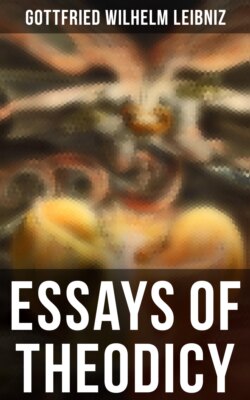Essays of Theodicy

Реклама. ООО «ЛитРес», ИНН: 7719571260.
Оглавление
Gottfried Wilhelm Leibniz. Essays of Theodicy
Essays of Theodicy
Table of Contents
PREFACE
PRELIMINARY DISSERTATION ON THE CONFORMITY OF FAITH WITH REASON
ESSAYS ON THE JUSTICE OF GOD AND THE FREEDOM OF MAN IN THE ORIGIN OF EVIL
PART ONE
PART TWO
PART THREE
APPENDICES. SUMMARY OF THE CONTROVERSY REDUCED TO FORMAL ARGUMENTS
EXCURSUS ON THEODICY
§ 392. published by the author in Mémoires de Trévoux. July 1712
REFLEXIONS ON THE WORK THAT MR. HOBBES PUBLISHED IN ENGLISH ON 'FREEDOM, NECESSITY AND CHANCE'
OBSERVATIONS ON THE BOOK CONCERNING 'THE ORIGIN OF EVIL' PUBLISHED RECENTLY IN LONDON
Отрывок из книги
Gottfried Wilhelm Leibniz
The Goodness of God, the Freedom of Man and the Origin of Evil
.....
44. Now we have no need of revealed faith to know that there is such a sole Principle of all things, entirely good and wise. Reason teaches us this by infallible proofs; and in consequence all the objections taken from the course of things, in which we observe imperfections, are only based on false appearances. For, if we were capable of understanding the universal harmony, we should see that what we are tempted to find fault with is connected with the plan most worthy of being chosen; in a word, we should see, and should not believe only, that what God has done is the best. I call 'seeing' here what one knows a priori by the causes; and 'believing' what one only judges by the effects, even though the one be as certainly known as the other. And one can apply here too the saying of St. Paul (2 Cor. v. 7), that we walk by faith and not by sight. For the infinite wisdom of God being known to us, we conclude that the evils we experience had to be permitted, and this we conclude from the effect or a posteriori, that is to say, because they exist. It is what M. Bayle acknowledges; and he ought to content himself with that, and not claim that one must put an end to the false appearances which are contrary thereto. It is as if one asked that there should be no more dreams or optical illusions.
45. And it is not to be doubted that this faith and this confidence in God, who gives us insight into his infinite goodness and prepares us for his love, in spite of the appearances of harshness that may repel us, are an admirable exercise for the virtues of Christian theology, when the divine grace in Jesus Christ arouses these motions within us. That is what Luther aptly observed in opposition to Erasmus, saying that it is love in the highest degree to love him who to flesh and blood appears so unlovable, so harsh toward the unfortunate and so ready to condemn, and to condemn for evils in which he appears to be the cause or accessary, at least in the eyes of those who allow themselves to be dazzled by false reasons. One may therefore say that the triumph of true reason illumined by divine grace is at the same time the triumph of faith and love.
.....